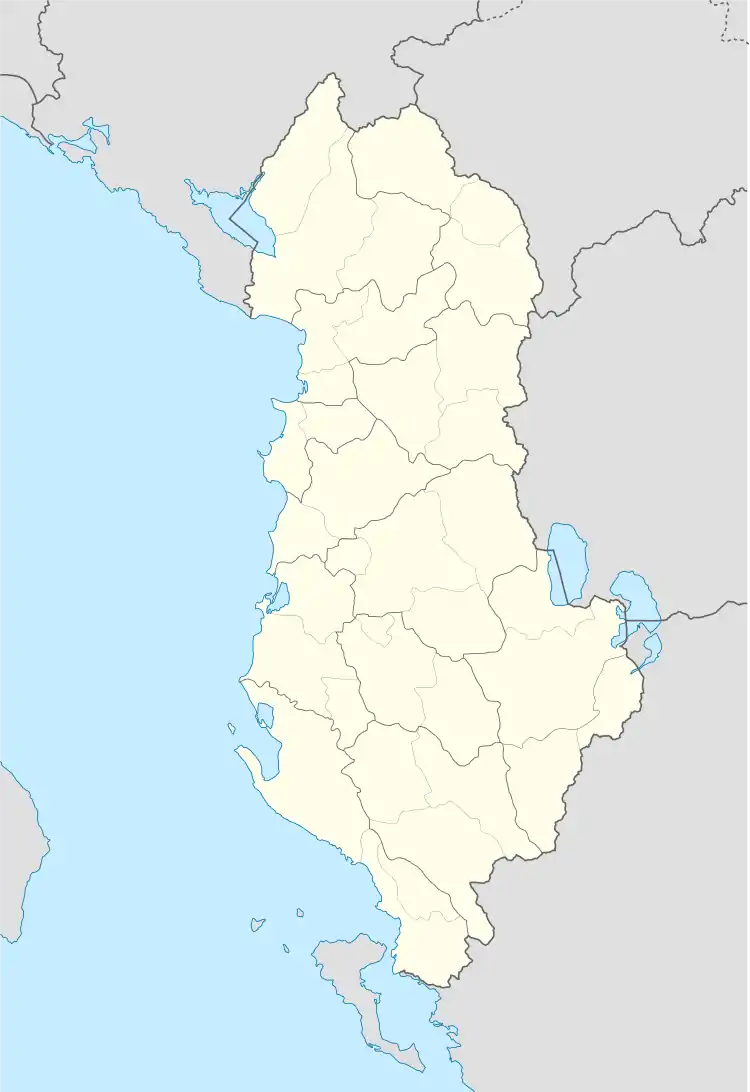Stegopul
Stegopull or Stegopul (Aromanian: Stãgopul) is a village in Lunxhëri, Gjirokastër County, Albania. At the 2015 local government reform it became part of the municipality Libohovë.[1] It is home to the Orthodox Church of St. Elijah's, also declared a national monument.[2]
Stegopull
Stãgopul | |
|---|---|
 Stegopull | |
| Coordinates: 40.094°N 20.251°E | |
| Country | |
| County | Gjirokastër |
| Municipality | Libohovë |
| Municipal unit | Qendër Libohovë |
| Time zone | UTC+1 (CET) |
| • Summer (DST) | UTC+2 (CEST) |
In 1989 Stegopull counted 160 inhabitants most of whom Orthodox Albanians and a minority of Aromanians,[3] but in the following year the Aromanian community outnumbered the rest of the population.[4]
Notable people
- Kostandin Boshnjaku, Albanian politician and communist.
- Kyriakos Kyritsis, Greek politician and lawyer.
- Ioannis Poutetsis, Greek revolutionary.
- Urani Rumbo, Albanian feminist[5]
References
- Law nr. 115/2014 Archived 2015-09-24 at the Wayback Machine
- Stegopul, Albania - find factsand information on Stegopul, Albania - Places-in-the-world.com
- Kallivretakis, Leonidas (1995). "Η ελληνική κοινότητα της Αλβανίας υπό το πρίσμα της ιστορικής γεωγραφίας και δημογραφίας [The Greek Community of Albania in terms of historical geography and demography." In Nikolakopoulos, Ilias, Kouloubis Theodoros A. & Thanos M. Veremis (eds). Ο Ελληνισμός της Αλβανίας [The Greeks of Albania]. University of Athens. p. 34. "Στα πλαίσια της επιτόπιας έρευνας που πραγματοποιήσαμε στην Αλβανία (Νοέμβριος-Δεκέμβριος 1992), μελετήσαμε το ζήτημα των εθνοπολιτισμικών ομάδων, όπως αυτές συνειδητοποιούνται σήμερα επί τόπου. [As part of the fieldwork we held in Albania (November–December 1992), we studied the issue of ethnocultural groups, as they are realized today on the spot.]"; p. 51. "ΑΧ Αλβανοί Ορθόδοξοι Χριστιανοί, Β Βλάχοι"; p.55. "STEGOPULLI ΣΤΕΓΟΠΟΥΛΟΣ. 160 ΑΧ + β".
- Gilles de Rapper. Better than Muslims, not as Good as Greeks: Emigration as experienced and imagined by the Albanian Christians of Lunxhëri The New Albanian Migration. Brighton-Portland, Sussex Academic Press (2005), p. 13: "It is true that in several villages (Selckë, Nokovë, Mingull, Stegopul), the Vlachs outnumbered the ‘villagers’ (fshatarë – this is how the Lunxhots call themselves and are called by the Vlachs) by 1990".
- de Haan, Franciska; Krasimira Daskalova; Anna Loutfi (2006). Biographical dictionary of women's movements and feminisms in Central, Eastern, and South Eastern Europe: 19th and 20th centuries. G - Reference,Information and Interdisciplinary Subjects Series. Central European University Press. pp. 475–77. ISBN 963-7326-39-1.
This article is issued from Wikipedia. The text is licensed under Creative Commons - Attribution - Sharealike. Additional terms may apply for the media files.